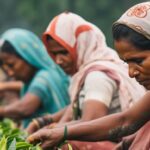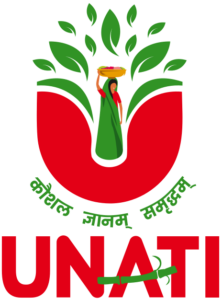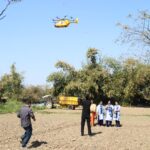In the foothills of the Shivalik Himalayas, a quiet revolution is taking place—one that blends environmental regeneration with rural empowerment, all under the guiding principle of cooperation. At the heart of this transformation is The Unati Agri Allied and Marketing Multi State Cooperative Society Ltd. (UAMMCL), an organization committed to reshaping India’s agricultural and ecological landscape through innovation, inclusivity, and sustainability.
🌱 Rooted in Tradition, Growing Toward the Future
Unati’s work builds upon a simple yet powerful idea: India’s future lies in its communities. Our ancestors thrived through collective effort—be it in farming, festivals, or faith. UAMMCL revives this spirit of cooperation by reimagining how agriculture, forestry, and rural enterprise can work together to benefit people and the planet.
Whether it’s boosting farmer incomes, empowering women, or improving nutrition, every initiative is designed with a long-term vision of Viksit Bharat—a developed, inclusive, and self-reliant India.
🎋 Bamboo: The Green Gold of Punjab
One of the most groundbreaking steps in UAMMCL’s sustainability journey is the introduction of bamboo-based agroforestry. Traditionally classified as a forest resource, bamboo has now been redefined as a grass, allowing for easier cultivation and commercial use. Why bamboo? Because it’s fast-growing, climate-resilient, and a natural carbon sink—absorbing nearly 1.5 times more CO₂ than many tree species.
The Vision:
- 100 acres of bamboo plantation in the lower Shivalik region.
- Partnership with local Panchayat lands and farmer members for plantation.
- Bamboo-based livelihoods in handicrafts, construction, paper-making, and food products.
- Long-term carbon sequestration and replacement of eucalyptus, which depletes groundwater.
By investing in bamboo, UAMMCL is not only addressing climate change but also providing farmers with year-round income and restoring degraded land with minimal inputs.
“ Our mission is not just to grow trees or crops, but to grow communities—rooted in cooperation, sustainability, and shared prosperity. ” Mr. Jyoti Saroop, Founder Director, UAMMCL
🌍 The Green Mission: Drones, Seed Balls & Bio-Diversity
Under the Unati Green Mission, technology and tradition meet in a stunning display of eco-innovation. The initiative uses drone technology to distribute seed balls—tiny, nutrient-rich capsules that contain seeds of native herbs, shrubs, and trees—across barren and degraded landscapes.
Each seed ball mimics the way birds naturally spread seeds, and when monsoon rains arrive, they germinate, restoring forest cover without manual intervention.
Key Highlights:
- Partnership with local Self-Help Groups (SHGs) to make seed balls.
- Special training for Unati Behan to become drone pilots.
- Integration with satellite imagery to track forest regrowth and carbon offset potential.
This effort is not only re-greening Punjab, but also creating jobs, especially for women and youth in rural areas.


🌊 Reviving Pong Lake: A Biodiversity Hotspot
UAMMCL’s sustainability efforts extend to Pong Lake, a Ramsar-designated wetland and wildlife sanctuary in Himachal Pradesh. Suffering from siltation and habitat degradation, the area around the lake has become a focal point for Unati’s restoration model.
The Strategy:
- Use bamboo and vetiver (khus) grass to stabilize soil and prevent erosion.
- Employ seed ball technology for reforestation in the lake’s catchment area.
- Collaborate with the Bhakra Beas Management Board (BBMB) and local communities for long-term ecological management.
- Explore carbon credit models for sustainable financing.
The goal? Restore natural water systems, improve bird habitats, and demonstrate how community-led conservation can succeed at scale.
“ From bamboo plantations to drone-powered green missions, every initiative we take is a step towards a self-reliant Bharat where people and the planet thrive together.” Mr. Vikrant Dogra, Chairman, UAMMCL
🌳 Guru Nanak Baghichi: Sacred Forests in Urban India
Inspired by the Miyawaki forest technique, Unati has proposed the creation of urban micro-forests under the name Guru Nanak Baghichi. In collaboration with organizations like EcoSikh, these sacred groves are designed to bring biodiversity into cities and towns.
Planted densely with native species, these forests grow 10 times faster and become self-sustaining in just a few years. They also serve as living temples of ecology—honoring tradition while fighting urban pollution.
🌾 The Bigger Picture: A Model for Climate & Cooperative Action
Unati’s initiatives go beyond tree-planting—they reflect a holistic climate action strategy. Whether it’s:
- Reducing chemical inputs through organic & Vedic farming
- Promoting agroforestry as an economic model
- Leveraging digital tools for land monitoring and app-based coordination
—every step is tied back to climate resilience, carbon reduction, and rural empowerment.
And importantly, these aren’t isolated projects. They’re interconnected, scalable, and designed for replication across India through cooperative networks.
Conclusion: Regeneration Through Participation
In an era where environmental degradation and economic inequality threaten rural India, UAMMCL offers a blueprint for regenerative growth—rooted in culture, driven by cooperation, and powered by innovation.
From forests to farmlands, from drones to bamboo groves, Unati is proving that climate action can be community action—and that the future of Bharat can be both green and inclusive.











